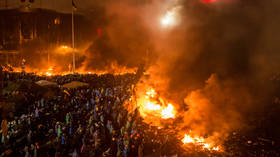Brent crude oil, the global benchmark, rose as much as 6 percent to more than $100 per barrel on Thursday after Russia invaded Ukraine and could climb further as Russia reacts to sanctions from the United States and Europe, before moderating somewhat. Russia is a major exporter of energy to Europe.
“Potentially, Russia could retaliate by limiting oil exports,” Patrick De Haan, head of petroleum analysis at GasBuddy, said on Thursday. Prices at the pump are likely to reflect repercussions from the conflict almost immediately, he said.
Some economists have noted an uncomfortable precedent when it comes to a gas shock.
Rising energy prices in the 1970s helped exacerbate inflation, causing rapid price increases to become a lasting feature of the economy, one that faded only after a painful response from the Fed. The central bank pushed interest rates — and unemployment — to double digits to bring price increases to heel during what is now known as the Great Inflation.
That episode happened after years of quick price increases that the Fed had proved slow to tamp down. This time, the central bank is gearing up to pull back support promptly.
The Fed is expected to initiate a series of rate increases in March, policy moves that should slow down lending and spending, which could translate into weaker hiring, more subdued economic growth and more modest price gains.
“The Ukrainian situation does not alter, likely, the fundamental conclusion that it’s time to change monetary policy,” said Julia Coronado, founder of MacroPolicy Perspectives. “They’re not going to just shelve all the interest rate increases because there is a war in Ukraine.”
Christopher Waller, a Fed governor, said during a speech on Thursday evening that the conflict could contribute to uncertainty, but that for now, the Fed should promptly pull back its support for the economy to try to control “alarmingly” high inflation.
Article source: https://www.nytimes.com/2022/02/25/business/economy/inflation-pce-index.html
